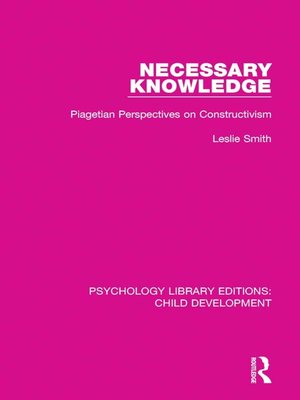Necessary Knowledge
ebook ∣ Piagetian Perspectives on Constructivism · Psychology Library Editions: Child Development
By Leslie Smith

Sign up to save your library
With an OverDrive account, you can save your favorite libraries for at-a-glance information about availability. Find out more about OverDrive accounts.
Find this title in Libby, the library reading app by OverDrive.



Search for a digital library with this title
Title found at these libraries:
| Library Name | Distance |
|---|---|
| Loading... |
Originally published in 1993, this monograph addresses a central problem in Piaget's work, which is the temporal construction of necessary knowledge. The main argument is that both normative and empirical issues are relevant to a minimally adequate account of the development of modal understanding. This central argument embodies three main claims. One claim is philosophical. Although the concepts of knowledge and necessity are problematic, there is sufficient agreement about their core elements due to the fundamental difference between truth-value and modality. Any account of human rationality has to respect this distinction. The second claim is that this normative distinction is not always respected in psychological research on the origins of knowledge where emphasis is placed on the procedures and methods used to gain good empirical evidence. An account of the initial acquisition of knowledge is not thereby an account of its legitimation in the human mind. The third claim relates to epistemology. Intellectual development is a process in which available knowledge is used in the construction of better knowledge. The monograph identifies features of a modal model of intellectual construction, whereby some form of necessary knowledge is always used. Intellectual development occurs as the reduction of modal errors through the differentiation and coordination of available forms of modal understanding. Piaget's work continues to provide distinctive and intelligible answers to a substantive and outstanding problem.







